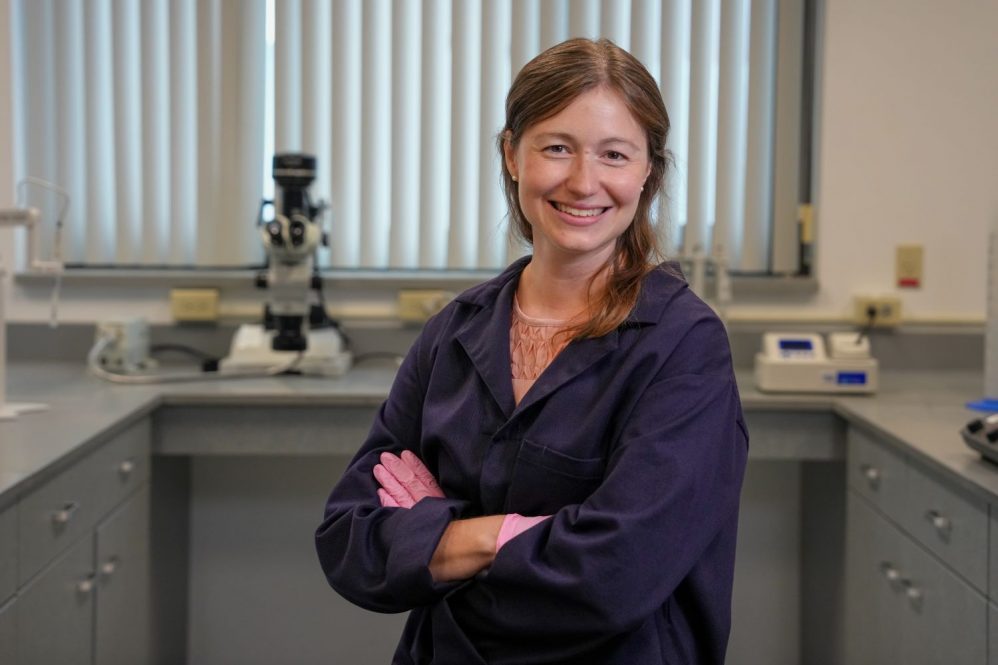When soldiers are in the field, they rely on food rations to sustain them. So, it’s critical that those rations are safe to eat.
UConn alum Genevieve Flock ’12 (CAHNR) ’17 Ph.D. helps ensure the safety of military food rations thanks to the training she received at UConn.
 Flock is a research microbiologist for the U.S. Army Combat Capabilities Development Command Soldier Center (DEVCOM) where her work includes topics like low moisture food safety, atmospheric water harvesting, validation of foodborne pathogen detection technologies and pathogen viability sensors.
Flock is a research microbiologist for the U.S. Army Combat Capabilities Development Command Soldier Center (DEVCOM) where her work includes topics like low moisture food safety, atmospheric water harvesting, validation of foodborne pathogen detection technologies and pathogen viability sensors.
“I constantly get to learn new things and find new, creative solutions for the soldier,” Flock says.
Flock’s interest in food microbiology began as an undergraduate at UConn where she majored in environmental science with a minor in animal science.
Through her minor, she took influential classes in the College of Agriculture, Health and Natural Resources (CAHNR) like food microbiology with Kumar Venkitanarayanan, CAHNR associate dean for research and graduate studies and professor of animal science.
After trying out several internships in environmental science, Flock decided to turn to public-health focused work in food safety. She stayed at UConn to pursue her Ph.D. with Venkitanarayanan.
“Having really good mentors in animal science got me interested in more of the public health side,” Flock says. “I shifted gears and thought I could have more success and fulfillment working in the public health area.”
When Flock was looking for a job, Venkitanarayanan helped her connect with a former student of his who was working at the U.S. Army DEVCOM Soldier Center.
The kind of applied work the Center did aligned well with Flock’s interests and experiences.
For her dissertation, Flock had studied a bacterium called Clostridioides difficile and its potential as a food-borne pathogen.
Like more well-known known food-borne pathogens such as Salmonella or E. coli, Clostridioides difficile was present in soil and water but its risk to humans through food like lettuce was not well understood at the time.
Flock says her graduate work helped prepare her for the project she is doing now through her appointment as a research biologist in UMass Lowell’s HEROES (Harnessing Emerging Research Opportunities to Empower Soldiers) program.
Flock is working with probiotics which, like Clostridioides difficile, are anaerobic organisms that can be difficult to grow in the lab.
Flock is investigating ways to improve the survivability of probiotics, which have a host of health benefits, in high-heat environments.
This is important because most probiotic products are designed to be refrigerated. But soldiers need to keep their rations in the field, which is often a very hot environment.
“The stability in the commercial space is not as important,” says Flock. “But for military use, if it were to be included in a food product, we don’t always have access to refrigeration. So, that high temperature survivability aspect continues to be a challenge.”
Flock is also working on low-moisture food safety.
Recently, there have been outbreaks of food-borne pathogens like Salmonella or E. coli in ingredients like flour and whey powder.
These ingredients are found in common ration items like protein bars or shakes. Since they do not undergo additional processing, like cooking at high temperatures, to kill off bacteria there is a risk of illness in these items.
“The infectious dose for those [pathogens] can be very low, so we wanted to understand the potential risks,” Flock says
Flock has completed a study that simulated storage of these products in a refrigerator, at room temperature, and at high temperatures throughout the products’ three-year shelf lives.
The goal of this work is to understand if certain ration products have a higher or lower risk of bacterial contamination and in what conditions they remain safe to eat.
Flock is also working on studies related to ration packaging which seek to reduce the space rations take up and increase biodegradability, so soldiers don’t need to carry trash around with them.
Flock says UConn helped prepare her for all the work she does by providing her with a network of mentors and peers as well as the technical skills she uses every day.
“Having that technological community, I think, really prepared me for designing methodology for our applied projects,” Flock says.
This work relates to CAHNR’s Strategic Vision area focused on Ensuring a Vibrant and Sustainable Agricultural Industry and Food Supply and Enhancing Health and Well-Being Locally, Nationally, and Globally.
Follow UConn CAHNR on social media



